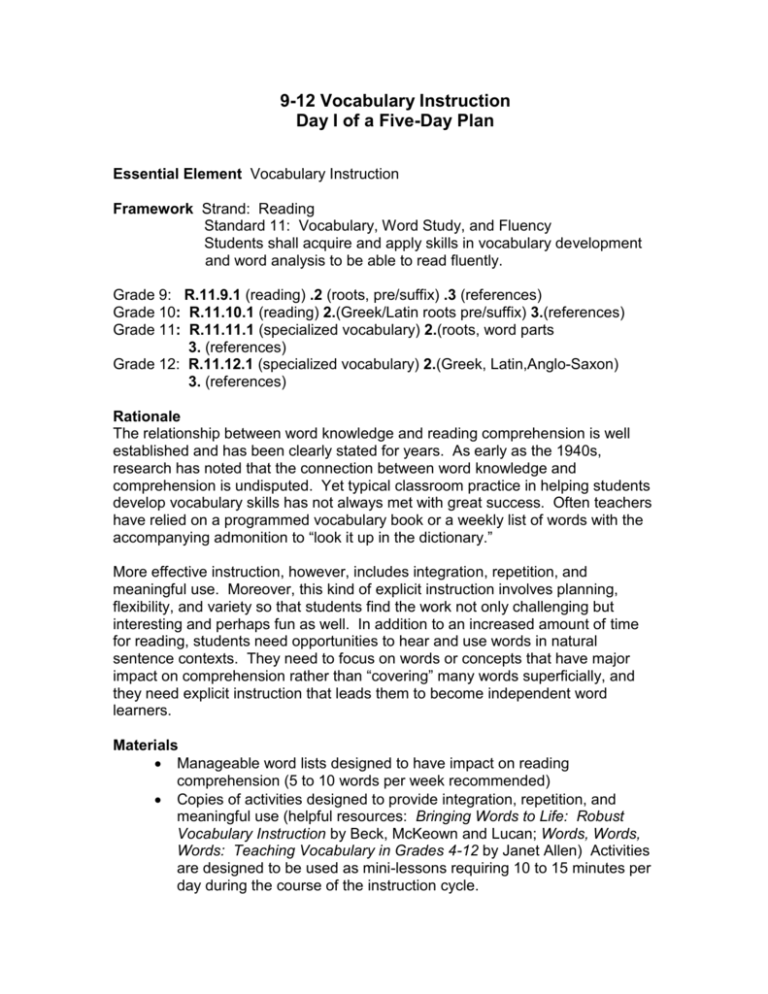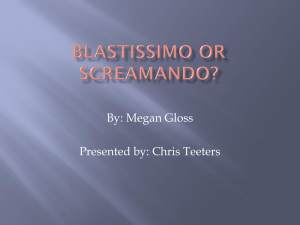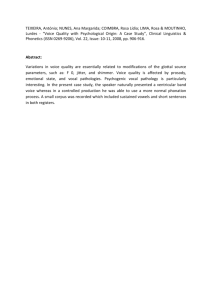
9-12 Vocabulary Instruction
Day I of a Five-Day Plan
Essential Element Vocabulary Instruction
Framework Strand: Reading
Standard 11: Vocabulary, Word Study, and Fluency
Students shall acquire and apply skills in vocabulary development
and word analysis to be able to read fluently.
Grade 9: R.11.9.1 (reading) .2 (roots, pre/suffix) .3 (references)
Grade 10: R.11.10.1 (reading) 2.(Greek/Latin roots pre/suffix) 3.(references)
Grade 11: R.11.11.1 (specialized vocabulary) 2.(roots, word parts
3. (references)
Grade 12: R.11.12.1 (specialized vocabulary) 2.(Greek, Latin,Anglo-Saxon)
3. (references)
Rationale
The relationship between word knowledge and reading comprehension is well
established and has been clearly stated for years. As early as the 1940s,
research has noted that the connection between word knowledge and
comprehension is undisputed. Yet typical classroom practice in helping students
develop vocabulary skills has not always met with great success. Often teachers
have relied on a programmed vocabulary book or a weekly list of words with the
accompanying admonition to “look it up in the dictionary.”
More effective instruction, however, includes integration, repetition, and
meaningful use. Moreover, this kind of explicit instruction involves planning,
flexibility, and variety so that students find the work not only challenging but
interesting and perhaps fun as well. In addition to an increased amount of time
for reading, students need opportunities to hear and use words in natural
sentence contexts. They need to focus on words or concepts that have major
impact on comprehension rather than “covering” many words superficially, and
they need explicit instruction that leads them to become independent word
learners.
Materials
Manageable word lists designed to have impact on reading
comprehension (5 to 10 words per week recommended)
Copies of activities designed to provide integration, repetition, and
meaningful use (helpful resources: Bringing Words to Life: Robust
Vocabulary Instruction by Beck, McKeown and Lucan; Words, Words,
Words: Teaching Vocabulary in Grades 4-12 by Janet Allen) Activities
are designed to be used as mini-lessons requiring 10 to 15 minutes per
day during the course of the instruction cycle.
Direct Instruction (Day One Mini-Lesson)
1) Create and distribute a list of 5 to 10 words. The list may include
a) content-specific words needed for comprehension of textbook or
other teaching material, b) high-frequency words necessary for
improved reading comprehension, or c) selected words designed to
teach a specific word-learning strategy.
2) In a whole-group activity, lead students to generate definitions that
are accurate but “user-friendly.” If students use dictionaries during
this process, lead the class to discuss the dictionary definitions and
develop their own definitions phrased for maximum understanding.
If the vocabulary list includes words designed to teach a specific
work-learning strategy, include an explanation of how this strategy
works. [Example: teach how knowledge of the voc- and vok- root
can help discover the meaning of new words.] End the lesson by
having students come to consensus and copy the agreed-upon
definitions in a word-study notebook or other appropriate place.
3) See “voc- and vok-” for an example of the types of definitions that
students might produce.
Copyright © 2006 Arkansas Department of Education. All rights reserved. School districts may reproduce
these materials for in-school student use only. No resale. Materials may not be reproduced, distributed or
sold for commercial use or profit. ADE employees are not authorized to waive these restrictions.
Day 1
(sample list of words)
voc- and vokThe roots voc- and vok- come from the Latin verb vocare, which means “to
call,” or from the Latin noun vox, which means “voice.”
Advocate—a verb: to recommend;
a noun: a supporter or a defender of a person or a cause
[ad, to + vocare, to call]
Avocation—a noun: a hobby
[a, away + vocare, to call]
Evoke—a verb: to call forth or to remind
[e(x), out + vocare, to call]
Invocation—a noun: a prayer at the opening of a ceremony
[in, in + vocare, to call]
Irrevocable—an adjective: not reversible, not able to be called back
[in/ir, not + re, back + vocare, to call]
Provocative—an adjective: arousing, stimulating, exciting, stirring
[pro, forth + vocare, to call]
Provoke—a verb: to make angry or to stir up to action
[pro, forth + vocare, to call]
Revoke—a verb: to withdraw, recall or reverse
[re, back + vocare]
Vocal—an adjective: having a voice or being outspoken
[vox, voice]
Vocation—an occupation or profession
[vocare, to call]
Tier II Additions
Select fewer words, (6-8), student will work on.
Tier III Accommodations/Modifications
Select no more than 5 words applicable to student.
Tier IV Modifications
Choose words that are more concrete than abstract.
Pre-teach teacher selected vocabulary words by pairing student with peer
and/or paraprofessional.
Tier V Modifications
Use any previously listed accommodations/modifications needed.
Allow student to use all senses to learn a word. For example, some words
are best learned by using motor movements (walk vs. gallop), some
through smell (aroma vs. odor), and some through touch (cool vs. icy).
Copyright © 2006 Arkansas Department of Education. All rights reserved. School districts may
reproduce these materials for in-school student use only. No resale. Materials may not be reproduced,
distributed or sold for commercial use or profit. ADE employees are not authorized to waive these
restrictions.
A Variety of Context Clues
To Teach the Word Vocal
1. The experience clue: EXAMPLE: The pep squad was the most vocal
group at the pep rally.
2. The comparison/contrast clue: EXAMPLE: A few students were vocal in
protesting the closed-campus rule; however, most accepted the change
quietly.
3. The synonym clue: EXAMPLE: Marty was vocal about his feelings, but he
is not usually so outspoken.
4. The summary clue: EXAMPLE: Tilly was vocal about her concern for the
environment; she spoke to all the students in an assembly and wrote
several letters to the editor.
5. The association clue: EXAMPLE: Armando was as vocal in his
expressing his opinion as a politician running for office.
6. The previous contact clue: EXAMPLE: If students understand that vocal
music is singing, they may understand that “vocal” relates to using one’s
voice.
7. Punctuation clues: EXAMPLE: The President is vocal (outspoken) in his
defense of his economic policy.








